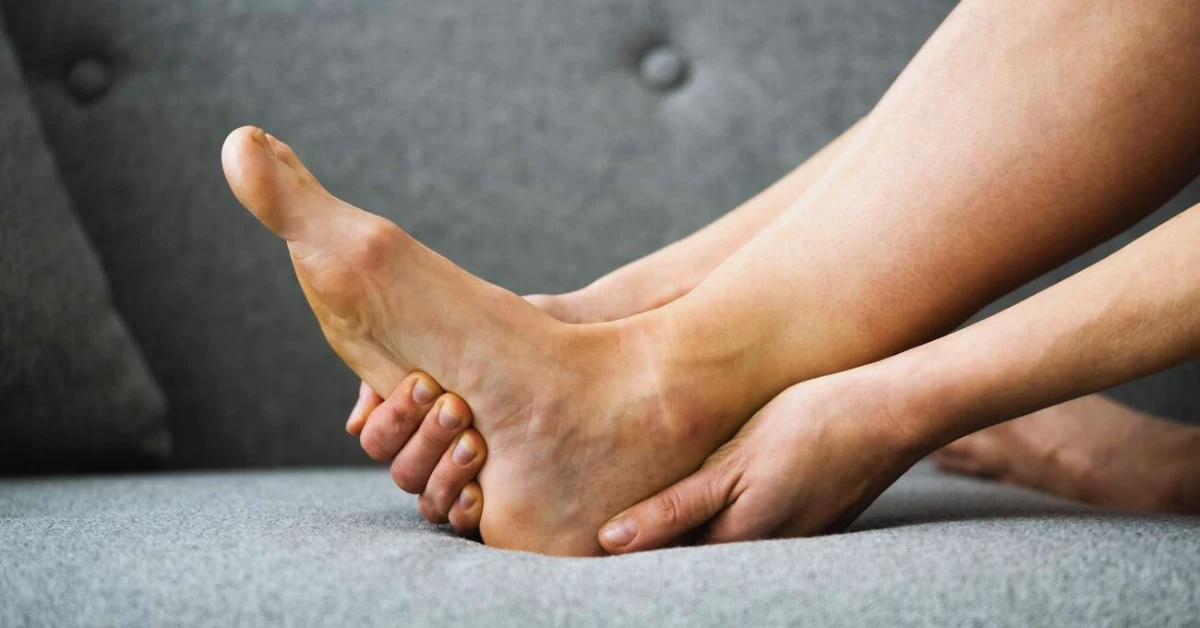Achilles tendonitis is a common condition that affects the Achilles tendon, the thick band of tissue connecting the calf muscles to the heel bone. It can cause pain, swelling, and stiffness, making it difficult to walk or engage in physical activities. Understanding the causes and symptoms of Achilles tendonitis is crucial for effectively addressing the condition and finding relief. In this blog post, we’ll explore proven methods for curing Achilles tendonitis quickly and getting you back on your feet.
Key Takeaways
- Achilles tendonitis is caused by overuse, improper footwear, and sudden increases in physical activity.
- Symptoms include pain, swelling, stiffness, and difficulty walking or running.
- Treatment options include rest, ice therapy, stretching, physical therapy, and NSAIDs.
Understanding Achilles Tendonitis: Causes & Symptoms
Achilles tendonitis often develops due to overuse or repetitive strain on the tendon. This can occur when you suddenly increase the intensity or duration of your physical activities, such as running or jumping. Wearing improper footwear that lacks adequate support or cushioning can also contribute to the development of Achilles tendonitis.
Common symptoms of Achilles tendonitis include pain and stiffness along the back of the heel, especially in the morning or after periods of inactivity. You may also experience swelling, tenderness, and difficulty walking or running. Recognizing these causes and symptoms is essential for taking prompt action and preventing further damage to the tendon.
How Long Does It Take For Achilles Tendonitis To Heal?
The healing process for Achilles tendonitis varies depending on the severity of the condition and individual factors. In general, mild cases may resolve within a few weeks with proper treatment and rest. However, more severe cases can take several months to fully heal.
It’s important to seek medical advice for an accurate diagnosis and personalized treatment plan. Your healthcare provider can assess the extent of the damage and provide a realistic timeline for recovery based on your specific situation.
Also Read: How To Cure Plantar Fasciitis In One Week? The Complete Action Plan
How To Cure Achilles Tendonitis Fast?
To cure Achilles tendonitis quickly, a combination of treatment methods is often the most effective. Here are some proven strategies to help you find relief and speed up the healing process:
- Rest: Give your Achilles tendon a break by avoiding high-impact activities that put a strain on the tendon. Switch to low-impact exercises like swimming or cycling until the pain subsides.
- Ice Therapy: Apply ice to the affected area for 15-20 minutes, several times a day, to reduce swelling and pain. Wrap the ice pack in a thin towel to protect your skin.
- Stretching Exercises: Gently stretch your calf muscles and Achilles tendon to improve flexibility and reduce stiffness. Hold each stretch for 20-30 seconds and repeat several times a day.
- Physical Therapy: A physical therapist can guide you through specific exercises and techniques to strengthen the muscles supporting your Achilles tendon and promote healing.
- NSAIDs: Over-the-counter non-steroidal anti-inflammatory drugs, such as ibuprofen, can help alleviate pain and inflammation. Follow the recommended dosage and consult with your doctor if you have any concerns.
Remember to follow a consistent treatment plan and listen to your body. If your symptoms worsen or persist despite these interventions, consult with a medical professional for further evaluation and guidance.
What Worsens Achilles Tendonitis And How To Prevent It?
Certain factors can exacerbate Achilles tendonitis and hinder the healing process. These include:
- Repetitive stress on the tendon from high-impact activities
- Inadequate rest and recovery between physical activities
- Wearing improper or worn-out footwear that lacks support
- Excessive running or jumping on hard surfaces
To prevent Achilles tendonitis or reduce the risk of recurrence, consider the following tips:
- Warm-up and Cool-down: Always start your workouts with a gentle warm-up and end with a cool-down to gradually transition your muscles and tendons.
- Gradually Increase Activity: When starting a new exercise routine or increasing the intensity, do so gradually to allow your body to adapt.
- Wear Appropriate Footwear: Choose shoes that provide adequate support, cushioning, and stability for your specific activities. Replace worn-out shoes regularly.
- Incorporate Strength and Flexibility Exercises: Regularly perform exercises that target your calf muscles and Achilles tendon to improve strength and flexibility.
- Listen to Your Body: If you experience pain or discomfort, take a break and allow your body to rest and recover.
Conclusion
Achilles tendonitis can be a frustrating and painful condition, but with the right treatment approach, you can cure it quickly and get back to your regular activities. By understanding the causes and symptoms, implementing effective treatment strategies, and focusing on prevention, you can take control of your Achilles tendon health.
Remember, early intervention is key to a speedy recovery. If you suspect you have Achilles tendonitis, don’t hesitate to seek medical advice and start taking steps to alleviate your symptoms. With patience, consistency, and the right care, you can overcome Achilles tendonitis and keep your tendons strong and healthy.
Read More: How To Relieve Lower Back Pain From Constipation? A Comprehensive Guide
FAQs
A: It’s best to avoid high-impact activities that strain the Achilles tendon. Focus on low-impact exercises like swimming or cycling until the pain subsides.
A: Ice therapy is generally recommended for reducing swelling and pain in the acute stage of Achilles tendonitis. Apply ice for 15-20 minutes, several times a day.
A: If you experience severe pain, significant swelling, or difficulty walking, your Achilles tendonitis may be more severe. Consult with a medical professional for an accurate assessment.
A: Yes, wearing high heels or shoes with inadequate support can put extra strain on the Achilles tendon and contribute to the development of Achilles tendonitis.

